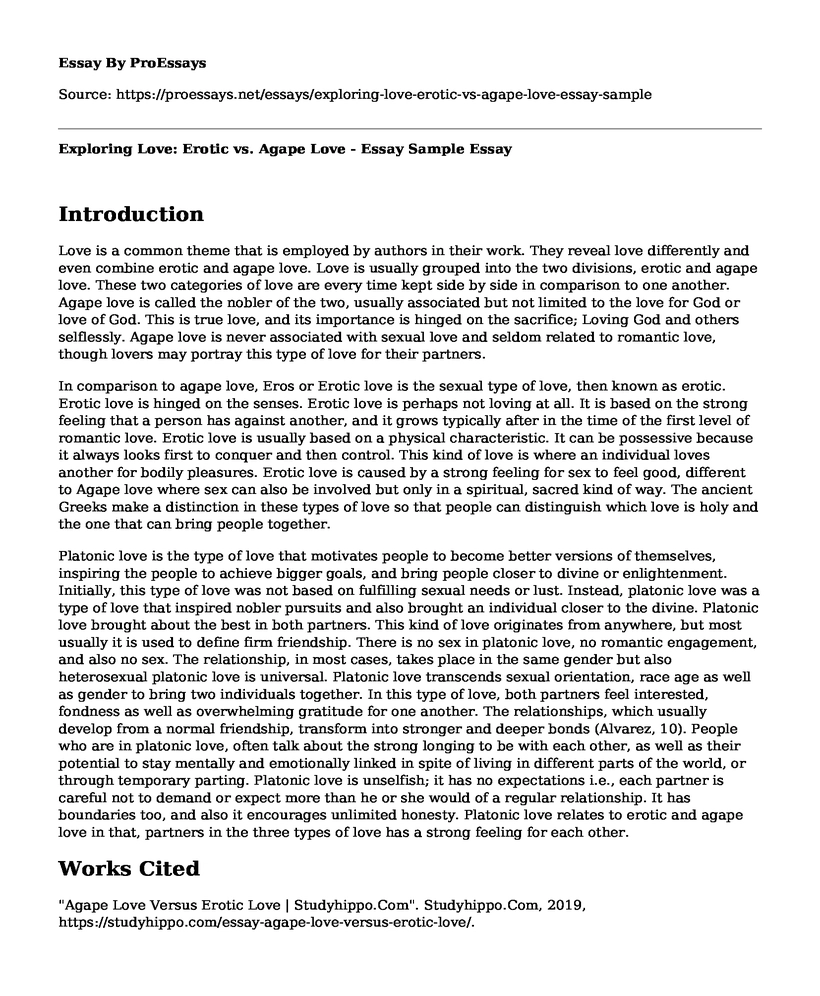Introduction
Love is a common theme that is employed by authors in their work. They reveal love differently and even combine erotic and agape love. Love is usually grouped into the two divisions, erotic and agape love. These two categories of love are every time kept side by side in comparison to one another. Agape love is called the nobler of the two, usually associated but not limited to the love for God or love of God. This is true love, and its importance is hinged on the sacrifice; Loving God and others selflessly. Agape love is never associated with sexual love and seldom related to romantic love, though lovers may portray this type of love for their partners.
In comparison to agape love, Eros or Erotic love is the sexual type of love, then known as erotic. Erotic love is hinged on the senses. Erotic love is perhaps not loving at all. It is based on the strong feeling that a person has against another, and it grows typically after in the time of the first level of romantic love. Erotic love is usually based on a physical characteristic. It can be possessive because it always looks first to conquer and then control. This kind of love is where an individual loves another for bodily pleasures. Erotic love is caused by a strong feeling for sex to feel good, different to Agape love where sex can also be involved but only in a spiritual, sacred kind of way. The ancient Greeks make a distinction in these types of love so that people can distinguish which love is holy and the one that can bring people together.
Platonic love is the type of love that motivates people to become better versions of themselves, inspiring the people to achieve bigger goals, and bring people closer to divine or enlightenment. Initially, this type of love was not based on fulfilling sexual needs or lust. Instead, platonic love was a type of love that inspired nobler pursuits and also brought an individual closer to the divine. Platonic love brought about the best in both partners. This kind of love originates from anywhere, but most usually it is used to define firm friendship. There is no sex in platonic love, no romantic engagement, and also no sex. The relationship, in most cases, takes place in the same gender but also heterosexual platonic love is universal. Platonic love transcends sexual orientation, race age as well as gender to bring two individuals together. In this type of love, both partners feel interested, fondness as well as overwhelming gratitude for one another. The relationships, which usually develop from a normal friendship, transform into stronger and deeper bonds (Alvarez, 10). People who are in platonic love, often talk about the strong longing to be with each other, as well as their potential to stay mentally and emotionally linked in spite of living in different parts of the world, or through temporary parting. Platonic love is unselfish; it has no expectations i.e., each partner is careful not to demand or expect more than he or she would of a regular relationship. It has boundaries too, and also it encourages unlimited honesty. Platonic love relates to erotic and agape love in that, partners in the three types of love has a strong feeling for each other.
Works Cited
"Agape Love Versus Erotic Love | Studyhippo.Com". Studyhippo.Com, 2019, https://studyhippo.com/essay-agape-love-versus-erotic-love/.
"What Is Agape Love?". Gotquestions.Org, 2019, https://www.gotquestions.org/agape-love.html.Alvarez, Sandra. "4 Characteristics Of Platonic Love". A Conscious Rethink, 2019, https://www.aconsciousrethink.com/7091/platonic-love/.
Cite this page
Exploring Love: Erotic vs. Agape Love - Essay Sample. (2023, Jan 16). Retrieved from https://proessays.net/essays/exploring-love-erotic-vs-agape-love-essay-sample
If you are the original author of this essay and no longer wish to have it published on the ProEssays website, please click below to request its removal:
- Bacon and Plato on Knowledge
- Maxim Universalizability Essay Example
- Paper Example on ADHD: Understanding Its Symptoms and Causes
- Identity Development and Discrimination: Essay Sample
- Essay Sample on Parents of Autistic Children: Perceptions and Use of Supplemental Treatments
- Essay Sample on Evil in World Religions: Defining Good and Bad
- Essay Sample on Schizophrenic Episodes in Berlin







